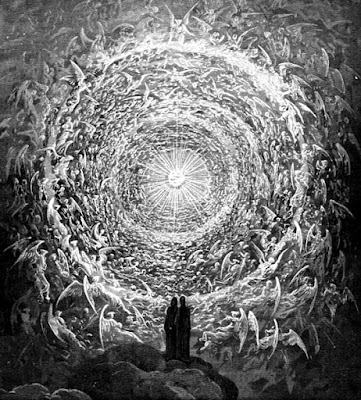A Little Slice of Heaven
 |
| Dante's view of heaven - God as a point of light surrounded by angels |
Define heaven.
I would define it a bit different...
Heaven is a physical state of relaxation, freedom, and acceptance.
Heaven is a state of feeling comfortable, safe, and at peace.
Heaven is a state of mind - at rest and free from worry or fear.
Not so much a place where anyone, supernatural or otherwise, actually lives, but an experience. Perhaps heaven and home could be defined similarly. I guess it would depend on if you felt all those things at the place you call home. I am very fortunate and privileged to say that our home at the beach is very much those things. A sanctuary in a world that can seem like it is spinning out of control. It has been said that we create both heaven and hell in our own hearts, minds, and lives. I believe this to be true.
Time off from school is a slice of heaven, as well. However, I can never just stand completely still (although I do try!). Did you know that there are free classes from Harvard Divinity School that can be accessed online? We are embarking on a wonderful series that features each major world religion through their scriptural texts...here is the LINK, if you are interested. Another goal is to read through the texts required for my next class; currently learning about St. Francis of Assisi, and St. Benedict is on deck immediately following. Medieval Christianity is fascinating, without doubt.
Speaking of Christianity, I was doing a bit of pondering on the bit of wisdom that is (currently) featured in the sidebar:
To study the Buddha's way is to study the self;
To study the self is to transcend the self.
To transcend the self is to be enlightened by all things.
To be enlightened by all things is to remove the barrier between self and others.
~Dogen
First of all, Dogen, born in 1200 CE, was a was a Japanese Buddhist priest, writer, poet, philosopher, and founder of the Soto school of Zen in Japan; in fact, he promoted the sitting practice of meditation called zazen. But, really, all that is fascinating but beside the point. My pondering focused more on his words than who he was. Basically what he was saying was to study the self, to gain self-knowledge, is to transcend the self, resulting in being "enlightened by all things." Enlightenment dissolved the barriers between the dualism of 'us and them' or 'you and me.' This all reminded me very much of what St. Catherine of Siena taught; that one needed to develop a "cell of self-knowledge" in order to know and commune with God (by solitary contemplative prayer, not so unlike sitting meditation). When knowledge of self was known in relation to God, then one would understand how to fully and selflessly give love to others; in essence dissolving the barriers between you and your neighbor. Both teachers, separated by about a couple centuries, thousands of miles, and religious doctrine, were saying the same thing: one must somehow rise above self-centeredness (call it either self-knowledge or enlightenment) in order to understand the reality of ourselves, our circumstances, and the ultimate goal of giving unconditional love to others. It is in this endeavor that we truly live.
And with that, we are back to the concept of heaven. Giving selflessly, with no motive other than to give happiness or rest to someone else, is creating heaven in ourselves, and possibly for others. Some might question whether this is even possible - can someone act without self-serving motivation? I suggest giving without any expectation of return is possible.
The sun rises without getting anything in return.
The flower smells sweet without receiving anything but a short life.
The wind carries rain to water the land,
and the birds spread seeds and give pleasure to the eyes with no pay.
I think humans can be selfless, as well;
giving without expectations of return.
I guess this is my radical idea of heaven.
Comments